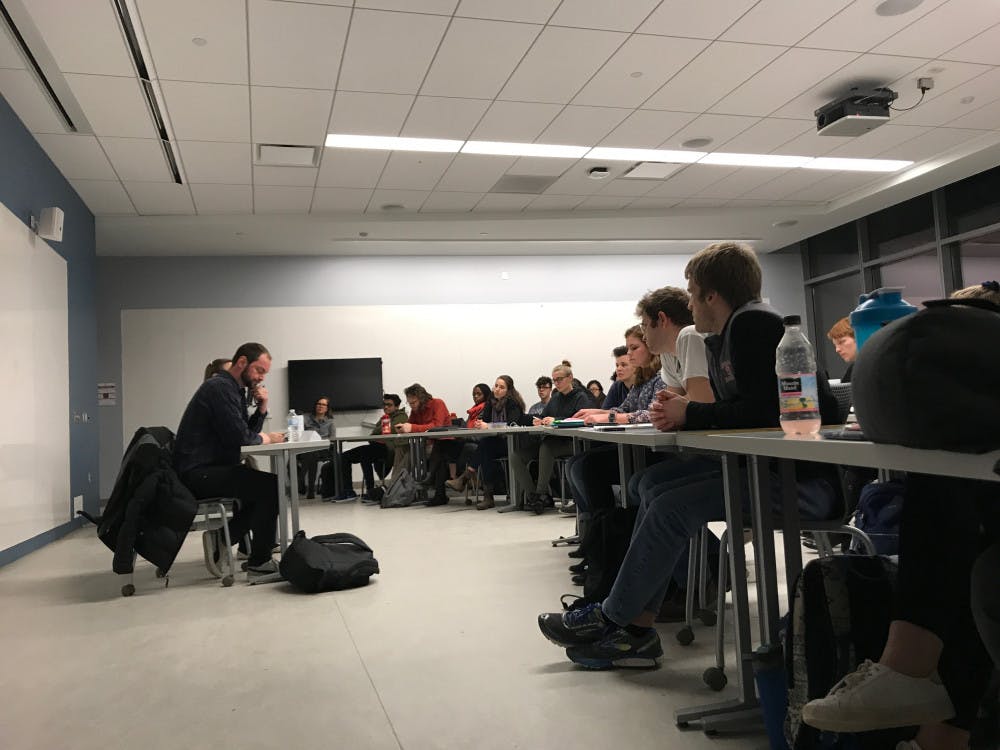Demands, definitions and durable solutions were discussed during a Comparative Refugees Studies Panel this week.
[playlist ids="14045"]
The panelists included Dr. Ria Chae, East Asian Languages and Studies Professor, and Nicholas Greven, Indiana University Latin American and Caribbean Studies Master Student. Each spoke of what they’ve come to know about migrants durings their experiences abroad.
Ria Chae, raised in South Korea, is a historian specializing in inter-Korean relations. She began her portion of the panel by defining three types of terms used to describe people on the move.
“These three terms are refugees, migrants and defectors,” Chae said.
A migrant is the overarching term to describe all people on the move for any reason, both forced or voluntary. A refugee is a displaced person who was forced to leave their home. Refugees have already crossed an international border but still plan to return home once the conditions are safe. Lastly, a defector is a person who seeks opportunity to leave their country due to the conditions and systems but are not forced.
Chae says the term defector is most commonly used in South Korea to describe a person who moved from North Korea to leave their political and economic system behind. She disclaims that there is a difference between a refugee and a defector, but both are types of migrants.
“Not all refugees are defectors,” Chae said. “And not all defectors are refugees.”
One solution Chae suggested during the panel was the use of media by Korean defectors as a way to tell their stories.
“If students, American students, get in touch with North Korean defectors and South Korean and help their english ability or help to raise awareness,” Chae said. “For example, translating North Korean talk-shows into English.” She says if other areas of the world were to do this as well, we could begin to find these durable solutions.
“So that could be maybe a very small step,” Chae said. “But it could definitely help towards solving the problem of integration.”
Nicholas Greven, the second panelist, researched and volunteered along Mexico’s southern border region and wrote an article called “The Southern Border Plan on the Ground in the Trump Era" published on NACLA. During the panel, he described his experience witnessing migrants travel from Central America through Mexico.
“Advocating for immigrants is something very close to my heart,” he said.
Greven mentions another term to describe people on the move: an asylum seeker. This type of migrant is forced to leave their home, similar to a refugee, but does not seek to return. An asylum seeker wishes to permanently settle in a new country
Since the United States implemented the Southern Border Plan (SBP), it has deterred migrants and potential asylum seekers from passage into America. Due to the increased border security, migrants had to travel more dangerous routes. Greven says while he volunteered at the shelters, a huge portion of the migrants he interviewed were assaulted, robbed, extorted or even all three.
“The U.S. government is killing many, many people and causing others to suffer very intensely because it’s racist,” Greven said. “They want to profit off of people suffering.”
Greven says there has been a long history of major powers violently extracting resources from countries of the global south. His long-term durable solution for refugees, migrants, asylum seekers and defectors he says would be for this to end and for these large governments to stop forcing people to flee.
“The only other solution I can think of is for the U.S. to provide more asylum, many, much larger quantities of people.” Greven said. “I don’t like seeing people put in cages and tortured.”
The Comparative Refugees Studies Panel: Durable Solutions was hosted by No Lost Generation, Students for Peace in the Middle East, Liberty in North Korea and the Center for the Study of the Middle East. It was hosted within the School of Global and International Studies at Indiana University.





